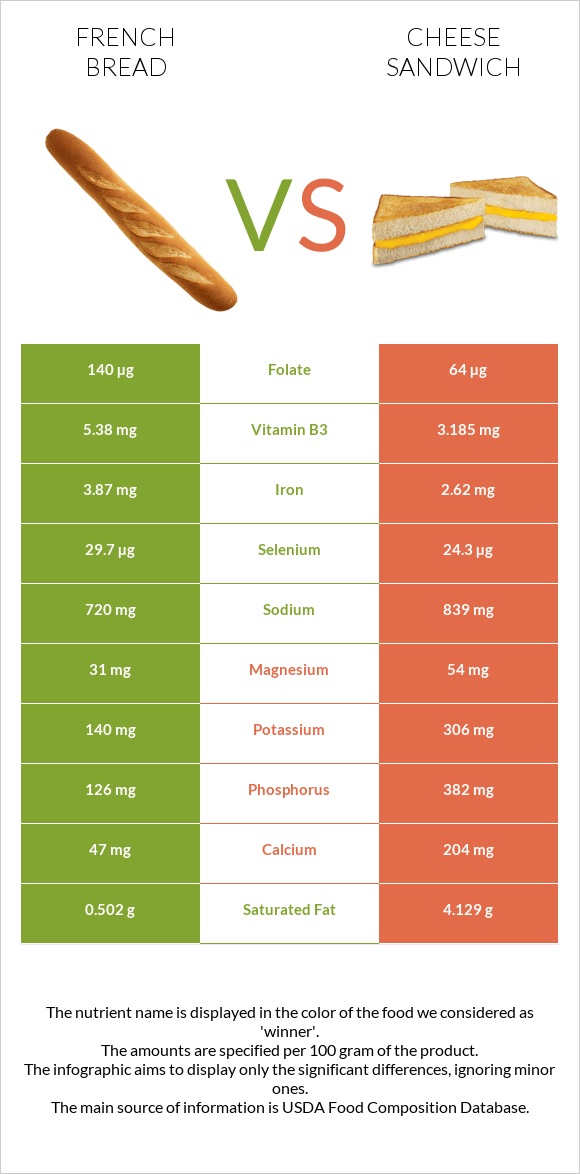French bread vs. Cheese sandwich — In-Depth Nutrition Comparison
Compare
Summary of differences between french bread and cheese sandwich
- French bread has more folate, iron, vitamin B3, selenium, and vitamin B1, while cheese sandwich has more phosphorus, manganese, calcium, and vitamin B6.
- Cheese sandwich covers your daily need for phosphorus, 37% more than french bread.
- French bread contains 2 times more folate than cheese sandwich. While french bread contains 140µg of folate, cheese sandwich contains only 64µg.
- The amount of saturated fat in french bread is lower.
- Cheese sandwich has a lower glycemic index. The glycemic index of cheese sandwich is 54, while the glycemic index of french bread is 78.
These are the specific foods used in this comparison Bread, french or vienna, toasted (includes sourdough) and Crackers, wheat, sandwich, with cheese filling.
Infographic

Infographic link
Mineral Comparison
Mineral comparison score is based on the number of minerals by which one or the other food is richer. The "coverage" charts below show how much of the daily needs can be covered by 300 grams of the food.
| Contains more IronIron | +47.7% |
| Contains more ZincZinc | +20.7% |
| Contains less SodiumSodium | -14.2% |
| Contains more SeleniumSelenium | +22.2% |
| Contains more MagnesiumMagnesium | +74.2% |
| Contains more CalciumCalcium | +334% |
| Contains more PotassiumPotassium | +118.6% |
| Contains more PhosphorusPhosphorus | +203.2% |
| Contains more ManganeseManganese | +89% |
Vitamin Comparison
Vitamin comparison score is based on the number of vitamins by which one or the other food is richer. The "coverage" charts below show how much of the daily needs can be covered by 300 grams of the food.
| Contains more Vitamin EVitamin E | +∞% |
| Contains more Vitamin B1Vitamin B1 | +19.3% |
| Contains more Vitamin B3Vitamin B3 | +68.9% |
| Contains more Vitamin KVitamin K | +∞% |
| Contains more FolateFolate | +118.8% |
| Contains more Vitamin CVitamin C | +650% |
| Contains more Vitamin AVitamin A | +∞% |
| Contains more Vitamin B2Vitamin B2 | +15.4% |
| Contains more Vitamin B6Vitamin B6 | +171.9% |
| Contains more Vitamin B12Vitamin B12 | +∞% |
All nutrients comparison - raw data values
| Nutrient |  |
 |
DV% diff. |
| Polyunsaturated fat | 0.83g | 9.166g | 56% |
| Phosphorus | 126mg | 382mg | 37% |
| Fats | 2.14g | 25g | 35% |
| Monounsaturated fat | 0.386g | 10.351g | 25% |
| Manganese | 0.573mg | 1.083mg | 22% |
| Folate | 140µg | 64µg | 19% |
| Calcium | 47mg | 204mg | 16% |
| Iron | 3.87mg | 2.62mg | 16% |
| Saturated fat | 0.502g | 4.129g | 16% |
| Vitamin B3 | 5.38mg | 3.185mg | 14% |
| Vitamin B6 | 0.096mg | 0.261mg | 13% |
| Selenium | 29.7µg | 24.3µg | 10% |
| Calories | 319kcal | 497kcal | 9% |
| Protein | 13g | 9.8g | 6% |
| Vitamin B1 | 0.427mg | 0.358mg | 6% |
| Magnesium | 31mg | 54mg | 5% |
| Potassium | 140mg | 306mg | 5% |
| Sodium | 720mg | 839mg | 5% |
| Vitamin B12 | 0µg | 0.12µg | 5% |
| Vitamin B2 | 0.37mg | 0.427mg | 4% |
| Choline | 17.5mg | 3% | |
| Cholesterol | 0mg | 7mg | 2% |
| Zinc | 1.05mg | 0.87mg | 2% |
| Vitamin A | 0µg | 21µg | 2% |
| Vitamin C | 0.2mg | 1.5mg | 1% |
| Carbs | 61.93g | 58.2g | 1% |
| Copper | 0.15mg | 0.16mg | 1% |
| Vitamin E | 0.19mg | 1% | |
| Net carbs | 58.83g | 55.1g | N/A |
| Sugar | 3.59g | N/A | |
| Fiber | 3.1g | 3.1g | 0% |
| Vitamin B5 | 0.616mg | 0.622mg | 0% |
| Vitamin K | 0.5µg | 0% | |
| Tryptophan | 0.134mg | 0.13mg | 0% |
| Threonine | 0.316mg | 0.298mg | 0% |
| Isoleucine | 0.416mg | 0.383mg | 0% |
| Leucine | 0.762mg | 0.698mg | 0% |
| Lysine | 0.328mg | 0.344mg | 0% |
| Methionine | 0.168mg | 0.167mg | 0% |
| Phenylalanine | 0.543mg | 0.472mg | 0% |
| Valine | 0.476mg | 0.438mg | 0% |
| Histidine | 0.234mg | 0.219mg | 0% |
| Omega-3 - ALA | 0.05g | N/A |
Macronutrient Comparison
Macronutrient breakdown side-by-side comparison
Protein:
13 g
Fats:
2.14 g
Carbs:
61.93 g
Water:
20.61 g
Other:
2.32 g
Protein:
9.8 g
Fats:
25 g
Carbs:
58.2 g
Water:
3.2 g
Other:
3.8 g
| Contains more ProteinProtein | +32.7% |
| Contains more WaterWater | +544.1% |
| Contains more FatsFats | +1068.2% |
| Contains more OtherOther | +63.8% |
~equal in
Carbs
~58.2g
Fat Type Comparison
Fat type breakdown side-by-side comparison
Saturated fat:
Sat. Fat
0.502 g
Monounsaturated fat:
Mono. Fat
0.386 g
Polyunsaturated fat:
Poly. Fat
0.83 g
Saturated fat:
Sat. Fat
4.129 g
Monounsaturated fat:
Mono. Fat
10.351 g
Polyunsaturated fat:
Poly. Fat
9.166 g
| Contains less Sat. FatSaturated fat | -87.8% |
| Contains more Mono. FatMonounsaturated fat | +2581.6% |
| Contains more Poly. FatPolyunsaturated fat | +1004.3% |





